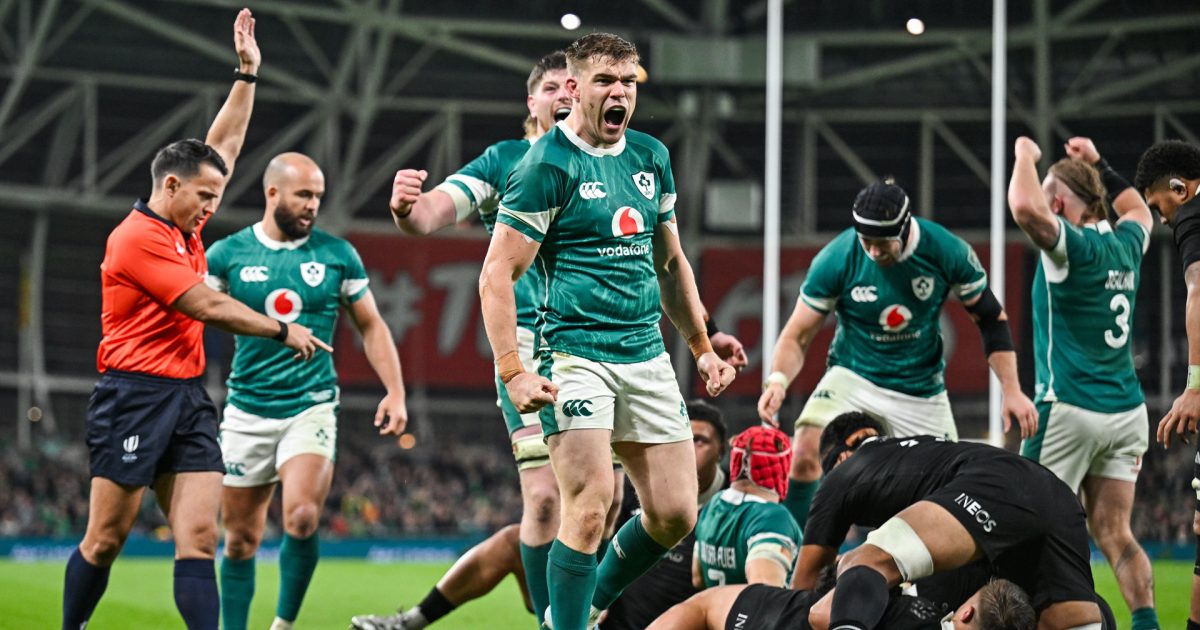The All Blacks will return to the historic site of their first-ever loss to Ireland when they meet again to play at Soldier Field in Chicago this weekend.
The Ireland-All Blacks rivalry over the last decade can be traced back to that 2016 game. Nearly 10 years ago Joe Schmidt’s Ireland side stunned the All Blacks 40-29 to beat New Zealand for the first time in 111 years. Since, the two nations share a 5-5 ledger.
As they prepare to resume one of the great rivalries of the modern era of international rugby again in Chicago, Ireland have two distinct off-field advantages over the All Blacks.
The first is the crowd factor, with a huge ex-pat Irish presence in the States running into the millions that no doubt will give them a boost.
The second, importantly from an All Blacks perspective, is New Zealand’s less-than-ideal record in neutral venue Test matches outside of Rugby World Cups.
From the 2023 Twickenham smashing at the hands of the Springboks, the 2020 first-ever loss to Argentina in Sydney, the aforementioned first-ever loss to Ireland in Chicago in 2016, all the way back to James O’Connor’s famous penalty to clinch a Wallabies in Hong Kong in 2010, the All Blacks have a history of losing more than usual in neutral locations.
Since 2008 when the All Blacks have taken fixtures to neutral venues, they have a 61 per cent win rate, eight wins coming with five losses. That is a considerable drop from the all-time mark of 76.7 per cent. The 2010s were the greatest ever decade of All Black rugby at 87.2 per cent, and it is some way below that.
Three of those eight wins include Fiji last year in San Diego, and two over Argentina in 2021 in Australia, who were in a poor state in the second Covid-impacted year.
The neutral venue does not seem to galvanise the All Blacks in the same way that playing in a hostile away location does. It seems the All Blacks can often fall into the trappings of ‘holiday mode’ a little too much.
Perhaps the very nature of the games aren’t taken seriously enough, with few trophies on the line. They’ve often been taken to neutral locations for commercial reasons but don’t have much at stake.
In the case of the 2023 loss to South Africa, it was a somewhat meaningless game on the eve of the Rugby World Cup. The 2016 Chicago game was a rare visit to the USA ahead of the European tour. The 2020 Hong Kong loss was the fourth Bledisloe Cup game, after the series was wrapped.
Again, this weekend’s Chicago Test is only an ‘exhibition’ Test with commercial priorities apparent. The All Blacks have a strategic plan to broaden their fan base as far and wide as possible, which requires playing offshore more.
Therein lies a conundrum. Should the All Blacks take more and more games to neutral locations, where their growing record is worse than both home and away results, how much impact will that have on the winning aspect of the brand.
Winning at a touch over 60 per cent is not the standard of excellence anywhere in sport but baseball. It’s good, but not great. The All Blacks are in Chicago but they aren’t playing the Cubs.
Scott Robertson’s biggest scalp so far is last November’s away win over Ireland by 23-13.
At the time Ireland were the world number one and the loss seemed to send Irish rugby until a spin. They fell off during the Six Nations in Andy Farrell’s absence, conceding the title to France.
But other than that Dublin coup, Robertson’s All Blacks have failed to make a mark against the top sides. They are three from four against the Springboks, including a humiliating home loss in Wellington. They lost to the French top side by a point in Paris last November.
Although they swept France 3-0 in July, no one would argue that French side is their strongest, and the closeness of that series was of concern.
Robertson needs this win over Ireland on two fronts, to improve the record of All Blacks Tests on neutral soil and to allay concerns that the All Blacks can’t mix it with the big boys of Test rugby.
If they lose to Ireland again in Chicago, it starts to put NZR’s All Blacks global strategy under scrutiny and puts Robertson’s own tenure in further jeopardy.

